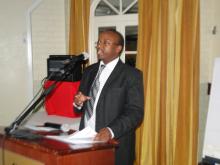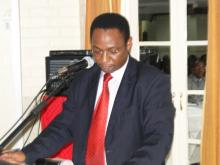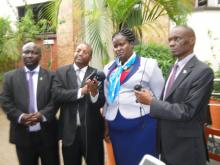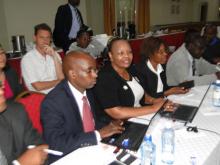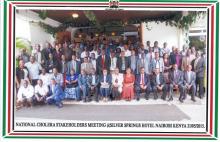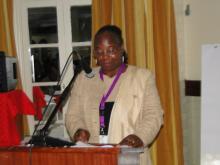Urgent Resolve to end Cholera Outbreak in Kenya
23 May 2015, Nairobi, Kenya - Health experts, leaders and county managers have this week, called for a concerted effort to end the cholera outbreak at once and save the lives of Kenyans.
A stakeholders meeting called by the national government to evaluate and find solutions to the cholera outbreak in the country noted the disease had affected 11 counties, led to loss of life and needed quick action to arrest the outbreak.
A communique was signed at the end of the deliberations to stop cholera in the next 30 days as part of the government rapid response initiatives (RRI).
The government has also allocated Ksh 500 million (US$5.2 million) to control cholera. This will be used to support implementation of the priority cholera prevention control strategies which include coordination and advocacy, surveillance and laboratory confirmation, case management, communication and social mobilization and procurement of essential medical supplies.
The country has experienced the spread of the cholera disease to 10 other counties after an initial case was reported in Nairobi County in December 2014. By May 20, 2015, a total of 3301 cases and 65 deaths had been reported with a CFR (case fatality rate) of 2%. Some Counties were more affected than others, among them Nakuru County which has reported 218 cases and 16 deaths, (CFR) 7.6 % within a month. The WHO recommends a CFR below 1 per cent.
The meeting was attended by the Principal Secretary Ministry of Health Dr Khadijah Kassachoon, World Health Organization country representative Dr Custodia Mandlhate, representatives from various government sectors, county directors of health, development partners, implementing partners and the media.
In his opening speech, Dr Jackson Kioko, head, DPPHS, who represented the Health Cabinet Secretary, called for an urgent multi-sectoral strategy to disrupt and stop the disease.
He said that the loss of life, 3000 cases of the disease and a second wave in two counties was unacceptable and an indication of systems not working. ”We need answers as to what is not working because cholera is associated with non-responsive health systems.”
He said the country needed to address other health concerns because cholera was treatable and could be managed at household level.
“We have other health concerns and we should be addressing them and not dealing with cholera at this point.
The outbreak was also a pointer at gaps in surveillance, sanitation and leadership, he added.
He said regular review meetings and analysis of data at every level was necessary to determine the trends of any county or facility.
“We also need to create awareness so people know the problem and make informed decisions.” He added.
He also suggested the need to identify cholera champions who could help mobilize community and work with schools to pass on the message for intervention.
Addressing the stakeholders, Dr Mandlhate noted that the meeting offered a golden opportunity to deliberate on the critical cholera prevention and control strategies especially in the devolved health situation in Kenya.
Underlining the importance of understanding the environment that had made the spread possible, she called on the need to assess early warning systems, capacity for rapid response, knowledge gaps in terms of case management, social mobilization, health promotion and integrated disease surveillance and response.
“Have we assessed the provision of clean water and appropriate sanitation?” she asked.
She said the UN agencies and development partners continued to support the government and MOH through technical support, resource mobilization and strengthening of surveillance for cholera prevention.
Support was also available in coordination of multi-sectoral cholera interventions and stakeholders, improved case management to reduce case fatality rate, water sanitation and in other ways.
She said WHO had developed a regional cholera control strategy that focused on broad strategies for cholera prevention and control and that member states were encouraged to adopt.
She noted African countries were derailed by weak health systems including ineffective surveillance and information systems and under-reporting of disease outbreaks.
Data from the WHO Africa Region showed 22 countries reported a total of 56,329 cases including 1367 deaths in 2013. This amounted to a case fatality rate of 2.43 per cent, considered too high.
The meeting which enabled county directors and surveillance officers to discuss the challenges and the way forward was also addressed by a representative of the counties Dr Mutile Wanyee (Kiambu county) who said county health managers wanted to address the shortfalls and bring the outbreak to an end.
She said counties were using the multi-sectoral approach but needed surveillance to be improved and under-reporting addressed. “We are acknowledging our shortfalls and want to address the outbreak through preventative measures
The signed communique was done with the knowledge that health as contained in article 43 of the constitution is a fundamental right of every Kenyan. It was also done in cognizance that cholera is a disease that meets the criteria of a public health event of international concern (PHEIC) as provided for by IHR (2005) and that it requires multi-sectoral approach to control both nationally and internationally.
The communique points at the various action points to be implemented at the national government, county and partners. It includes coordination, mobilizing and provision of resources, technical support and policy guidelines, capacity building. The counties will develop and implement cholera response plans which include heightening surveillance, case management, provision of safe water and sanitation, creation of community awareness and engagement.
Partners will provide technical, logistical and financial support to the national and county governments in responding to the outbreak
_______________________________________________________
For more information, please contact:
Technical contact:
Dr Joyce Onsongo; Tel: +254 722 509 403/+254 020 271 7902; Email: onsongoj [at] who.int
Media contact:
Dr Jemimah Mwakisha; Tel: +254 722 509 403/+254 020 271 7902; Email: mwakishaj [at] who.int




